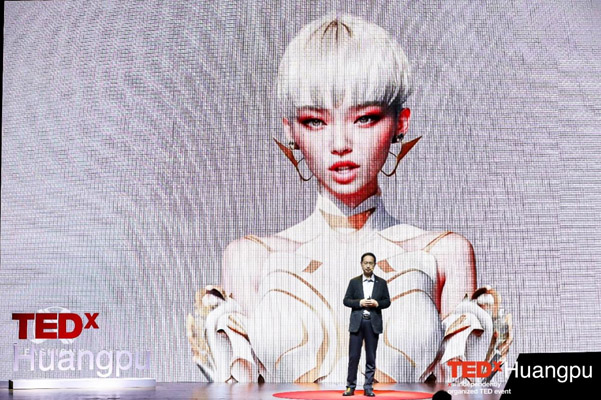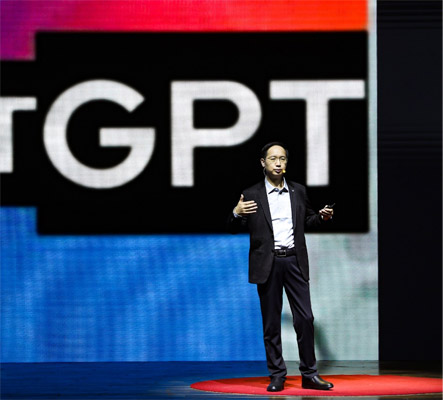AI will stimulate and extend human perception, thinking, and movement, says Terminus Group CTO at TEDx Shanghai
At the recent TEDx Conference in Shanghai, Dr. Hua Xinsheng, the CTO of Terminus Group, discussed the aspects of increasing use of AI and how it can affect people's lives, noting that the most important thing that people should keep up with the changes brought about by AI.
According to Dr. Hua, humans can embrace the use of AI to improve their skill set and capabilities and that the take away message is that the advent of the smart and intelligent age requires us to act now to take advantage of this technology and adapt.
With regard to one of the most useful features of the recently launched ChatGPT is its ability to create AI-generated content, which has raised the question as to the work that has, until now, been written by human content writers. The latest version, the GPT-4 model, a multi-modal large model, has already shown that it can perform well in various academic and professional benchmarks. Therefore, the questions about the advantages and challenges of ChatGPT have left many people wondering to what extent their jobs may be replaced by technology.
1) AI capabilities are rapidly iterating and becoming increasingly powerful
In recent years, the performance of AlphaGO and ChatGPT has undoubtedly pushed AI to a new level - AI has already influenced our live, such as smart manufacturing, smart medical treatment, cultural relics technical restoration, sports event interpretation, and more.
As a "veteran" who has been involved in the research on AI for more than 20 years, Dr. Hua Xiansheng believes that the accelerated iteration of AI benefits comes from the breakthrough development of its three core elements - algorithms, computing power, and data. The strengthening of AI capabilities will also promote the enhancement of human beings' ability to recognize, adapt, and develop the real world.
Dr. Hua believes that with the assistance of AI, people can be liberated from repetitive type works, and that this will free up opportunities to have more time and energy to pursue lines if work better suited to human endeavors and lead increasingly to a better quality of life for all – much as we already rely today on machines to mundane tasks from washing clothes or dishes to repetitive factory line work.
In the near future, smart home applications can further liberate people from tedious household chores, smart transportation management system will greatly reduce traffic accidents, cities will also be more convenient and efficient. One way in which this can be realized and supported is through the smart operating system TacOS (Terminus AI CITY Operating System), a proprietary software platform created and developed by Terminus Group.
Throughout human history, there have always been various question and concerns that naturally get asked when we envisage greater integration of automation. From the skeptical to the more Luddite reaction to technological progress in the First Industrial Revolution, in England, we need to be aware of the significant socio-economic and cultural effects that may be caused by the more ubiquitous use of AI. A key question is: Will we still have human advantages when we coexist with highly intelligent machines, in the future?

Dr. Hua Xiansheng, CTO of Terminus Group, talked to Lady AI on TEDxHuangpu in Shanghai
2) Human learning and technology both need to keep pace with the smart era and form a symbiotic relationship for society as a whole to prosper.
The suggestion that human labor is neither as fast nor as accurate as machines has long been accepted wisdoms when talking about mass production and, indeed, many jobs will, of course, be affected by AI. The flip side to this is that, much as we observed in the previous three industrial revolutions, Dr. Hua Xiansheng highlights that while technological development will eliminate some jobs, it will also create new jobs and roles; some of which we are yet to even conceive.
Dr. Hua says: "The emergence of the Spinning Jenny and the Watt Steam Engine, in the First Industrial Revolution, influenced a paradigm shift in how manual and textile workshops operated, and the new skills these textile workers operating the machine would work. The emergence of generators and electric lights in the Second Industrial Revolution led to many "lampmen" losing their jobs, but at the same time introduced the new skilled labor and professions, such as the electrician and electrical engineers. In the Third Industrial Revolution, the wide range and adoption of personal and enterprise computers made certain communications operators and typists redundant, a new breed of jobs emerged in areas of software engineers and the upskilling of office workers to take on newly simplified tasks.
In today's world, as we stand at the beginning of the Fourth Industrial Revolution (4IR), we already have automatic advertised image generation algorithms that can be applied wildly, which could produce thousands of images per second. This may gradually reduce the number of image fixing designers, while creative designers that can coexist with AI may gradually increase. In the field of industrial manufacturing, visual automatic quality detection technology is fast and accurate, making fewer and fewer workers rely on visual inspection on production lines, while the demand for more efficient and qualified product design, production, and management with machine assistance will increase.
The emergence of ChatGPT has presented a challenge to many clerical, knowledge-based, and information analysis work, but more creative, augmented and efficient work, combined with both human and ChatGPT input, may emerge in increasing numbers.
Dr. Hua believes that humans should take a more dialectic view of the pending human-machine symbiosis and, if we follow history's lead, allow us to project and apply more focus on realizing what jobs humans can apply themselves to in order to keep pace with the technology around them.

Dr. Hua Xiansheng, CTO of Terminus Group, gave a speech on TEDxHuangpu in Shanghai
3) The advantages and limitations of AI are obvious, so human-machine symbiosis can be seen as the future.
There are, of course, speculations on whether AI will comprehensively go beyond or eventually dominate humans; however, Dr. Hua Xiansheng is optimistic about the future of humankind as artificial general intelligence (AGI), still remains a way off and the way in which we deploy technology is as crucial as whether we can create it.
In his TEDx Shanghai speech, Dr. Hua shared with the audience the logicism, connectionism, and naturalism of AI, which have been partially verified in real practices such as AlphaGO and ChatGPT. In doing so, he exposed both the advantages and limitations of AI.
Currently, it is safe to say that AI is good at things that have a large amount of digital information, computation, patterns, rules, and limited steps to go with results, such as large-scale search and fine pattern recognition, such as playing chess to a level beyond any human grandmaster. On the other hand, AI is not particularly good at things that have less digital information, no obvious rules, are not easy to quantify, and have inherent variants and uncertainty, such as art, emotions, innovative creativity, human psychology, consciousness, philosophical speculation, among others.
Dr. Hua's view is that AI is a partial simulation and extension of human abilities such as perception, thinking, and movement, while an ideal, symbiotic society of human and machine would require machines to do what machines are good at, and humans to do what humans are good at. Essentially, machines providing services to humans, humans curating or managing such services and thereby achieving dynamic balance.
4) Humans who combine "outward and inward" exploration are irreplaceable.
One possible fear expressed has been shown through the Pixar film "WALL-E", which depicted a scenario where humans relied too heavily on machines and become "fragile giant babies" so that even if they fall, they can only rely on the assistance of machines to get up. This picture reflects concerns; however, through the approach of symbiosis, it is possible to have AI that will become more and more powerful as an assisting tool, rather than to make humans vulnerable, whether that be physical, intellectual, or psychologically.
Dr. Hua Xiansheng believes that while AI brings benefits to humans, it also puts forward higher requirements for themselves: we should not only improve our understanding and management of the outside world, but also improve our understanding and management of humans themselves inside.
Our AI capabilities used to be more "outward-oriented", creating better tools and products through AI, thereby recognizing, adapting and developing the world. If we enhance our own capabilities "inwardly", humankind's wisdom in life, survival, and development can be enhanced, not impeded or overtaken, in the future.
Dr. Hua proposed two ways we could explore this. The first is to improve human learning efficiencies and effectiveness through AI capabilities. This includes not only knowledge learning but also an ability for mastery and character cultivation. The second is to enhance humans'ability to recognize and manage their own body and mind through AI (at the level of life quality, competitive and intellectual capacity).
AI stands as one of the most proud creations of humankind, but its big challenge to humanity does not come from "seizing human work" or "generating self-awareness to replace humanity," it lies in whether human capabilities and wisdom can be improved simultaneously while AI serves as a tool to strengthen human capabilities.
Dr. Hua Xiansheng believes that in the era of smart and intelligence, it is not the just the tech experts who have to deal with AI technology in the "spirit of all things for the greater good," – it is a discussion for everyone who can help fully realize, regulate and utilize AI technology in a way that will improve humanity’s abilities, progress and knowledge. This is the higher integration, the higher ambition – a human-oriented, human-machine synergy for a better world.
